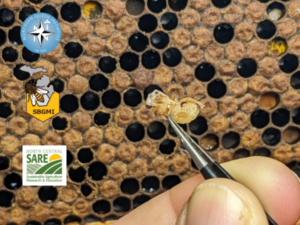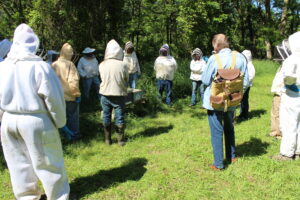Progress report for ONC24-153
Project Information
This project will address the deficiency in Michigan market availability of honey bee queens bred for parasite and viral resistance. Michigan beekeepers depend on importation of honey bee queens from non-Northern suppliers and breeders that raise queens and bees that are not adapted to Northern climates. Along with the challenge of environmental stress, diseases harbored by the varroa mite plague beekeepers in hobbyist, sideline, and commercial capacities thus negatively impacting successful seasonal honey harvests.
The deficiency in locally adapted mite-resistant honey bee queens compounds the issues beekeepers face in every scale of beekeeping
from 1 hive to 500. The agricultural industry is dependent on honey bees for sustainability in all facets of the food system. Large operations cannot dedicate time and resources to the processes required for selective breeding in honey bees. This project seeks to improve market availability and access to sustainable honey bee queens while incentivizing adoption of stock by reducing time and labor cost associated with adoption. This project will increase production of queens for all beekeeping operations by developing a network of capable queen producers. This project will directly and indirectly influence regional honey bee mating areas that benefit all beekeepers regardless of scale.
- Establish a network of production for selected stock to improve Michigan honey bee mating areas and develop a sustainable reservoir of selected stocks.
- Provide local/regional access to queen stocks through local pick up from producers, bee clubs, and overnight mailing.
- Distribute media and conduct workshops for 400+ club members and 1000+ media subscribers.
- Recruit additional queen producers to amplify project objectives and methods and improve regional saturation of viable honey bee queen stocks.
- Breed lineages established as Northern queens producing offspring selected for mite and viral resistance, Northern winter survivability, and honey production.
Cooperators
- (Educator)
- - Technical Advisor (Educator)
Research
Educational & Outreach Activities
Participation summary:
A virtual presentation of the project overview and year 1 progress was given for 204 registrants and subsequently distributed via SBGMI YouTube for 3,200 subscribers, and warranting 1,600+ views. This video remains publicly accessible for beekeepers, queen breeders, bee clubs, and other organizations to replicate or glean successes for their own programs for developing mite-resistant honey bee queens. (https://youtu.be/tT6C6a_dCpA)
Consultation and presentation of the program was given to the Colorado State Beekeepers Association via Zoom December 18, 2024, providing an overview of the program to assist them in development of a similar program focused on sustainable practice using mite-resistant honey bee queens. A similar demonstration was provided to the American Beekeeping Federation for Bee Pactical Award Recipients, of which the NQI was nominated for in 2023. The ABF presentation occurred August 9th, 2024. Another Colorado association was consulted but unfortunately, not documented.

Students will gain a comprehensive overview of the Harbo Assay with printed, video, and interactive media. At the end of the course students will have learned the background, function, and application of methods for conducting assays with their own honey bees. Students will be able to measure Varroa Sensitive Hygiene in their own honey bee populations.

This course is a prerequisite for all individuals planning to register for the hands-on queen rearing classes through the Northern Queen Initiative. You must complete this course before registering for hands-on classes. You will receive a link to register for the hands-on class along with a certificate upon completion. You do not need to be enrolled in a hands-on course in order to complete this. All are welcome.
Learning Outcomes
During the project, two queen-rearing classes were conducted in June of 2024. Two locations in Michigan were selected to conduct hands-on honey bee queen rearing courses. A prerequisite video course was mandated to permit attendance to the hands-on field day portion.
Class one was conducted in conjunction with 7 Ponds Beekeeper Club, Dryden, MI. 6.8.2024 with 19 participants.
Class two was conducted in conjunction with Berrien/Cass Beekeepers Club, Niles, MI. 6.22.2024 with 12 participants.Participants were provided with a survey to ascertain ratings in ten categories, with eight of them soliciting closed ended scale responses: Overall satisfaction, instructor effectiveness, course content, clarity of information, hands-on experience, class materials, interaction and engagement, recommendation, suggestions for improvement, and additional comments.
Scale based responses included five options in descending order from high to low. High responses were in the affirmative with the lowest response indicating the negative.
Of the 31 participant responses, all fell within the first and second affirmative categories, expressing high levels of satisfaction, good effectiveness, thoroughness of content covered, clear information, helpful activities increasing understand queen rearing techniques, useful class materials, highly interactive and engaging presentation, and likelihood to recommend class too other beekeepers.
Pre and Post tests were given to measure and assess prior knowledge and retention of class materials.
Participants demonstrated improvement in understanding of queen-rearing principles and techniques in all 10 questions posed during pre and post test submissions. These areas of knowledge, attitude, and skill included:
What is the primary purpose of queen rearing in beekeeping?
What are the main methods used for queen rearing?
Describe the difference between grafting and the use of queen cups in queen rearing.
At what stage in the development of a queen bee is she typically transferred to mating nucs or hives?
What factors should be considered when selecting larvae for grafting in queen rearing?
What is royal jelly, and why is it important in queen rearing?
What is the ideal age of larvae for grafting in queen rearing?
What are the signs that a queen cell is ready to be placed in a mating nuc or hive?
What is supersedure, and how does it differ from swarm cells in the context of queen rearing?
How can beekeepers ensure the success of newly mated queens after they are introduced into mating nucs or hives?
Have you tried grafting before and do you plan to use these techniques in the future?
Project Outcomes
This project has incrementally affected sustainable practice in beekeeper operations by shortening the timeline of selection for mite-resistant honey bee queens in their personal apiaries. This accelerated selection process not only enhances colony survival rates but also reduces reliance on chemical mite treatments, leading to cost savings, improved environmental outcomes, and greater long-term profitability for beekeepers.
Production expense is also reduced for partnership beekeepers via the project allowing focus on development and implementation of breeding criteria to improve honey bee queen stocks in beekeeper apiaries. Materials and supplies provided to beekeepers included grafting tools, trays for performing assays, queen cages, cell protectors, and other essential supplies that typically inflate the average cost of queen production. By lowering the barriers to entry for queen breeding, beekeepers can maintain more self-sufficient operations, ensuring economic resilience while supporting sustainable beekeeping practices that promote bee health and biodiversity.
Beekeepers were able to access a broader base of potential customers through collaboration with the Sustainable Beekeepers Guild of Michigan (SBGMI), a virtual educational group with 750+ subscribing members and a mailing list with over 2,000 subscribers. This access improved market access for beekeepers to sell honey bee queens at broader scale and improve overall fiscal viability of implementing a selection program for mite-resistance while producing honey bee queens. This queen portal demonstrates an economically viable model for replication by others and continued use by the SBGMI to distribute mite-resistant stocks at a much higher capacity than usual alternatives (face to face, Facebook marketplace, personal website development). Expanding the market for mite-resistant queens strengthens the beekeeping industry’s economic sustainability, encourages wider adoption of healthier genetics, and fosters a collaborative, knowledge-sharing community that enhances long-term agricultural resilience.
220 Virgin VSH Queens from Stevens Bee Co. distributed through group order pickup locations in Michigan via partnership beekeepers and other Michigan beekeeper cooperators. This increases access to tested and proven mite-resistant honey bee queens that beekeepers are able to purchase and used to mate with local "Northern" adapted stocks in their area creating hybrid stock that contributes to local mating and genetics. Widespread distribution of mite-resistant genetics enhances regional bee health, reducing colony losses and chemical dependency while ensuring a more stable pollination system critical for agricultural sustainability.
536 Virgin VSH Queens distributed via local pickup/overnight shipping in Michigan and abroad via partnership beekeepers with +70% of production distributed to Michigan beekeepers. Partnership beekeepers provided stocks selected from Michigan and integrated honey bee stocks that were tested and proven to be mite-resistant via the Harbo Assay and made available for all beekeepers. This increased access to tested and proven mite-resistant honey bee queens that beekeepers are able to purchase and used to mate with local "Northern" adapted stocks in their area creating hybrid stock that contributes to local mating and genetics. By ensuring that beekeepers have access to high-quality, resilient stock, this initiative strengthens local breeding programs, supports ecological balance, and increases financial viability for beekeepers by reducing losses due to mite infestations.
A collaboration and material transfer agreement was entered into with the Northern Queen Initiative and the USDA-ARS Baton Rouge Honey bee research lab to maintain, observe, and utilize verified mite-resistant stocks from USDA Pol-Line honey bee queen breeders. This exchange reduces time for selection of viable stocks for future production by partnership beekeepers an estimated 2-3 seasons or more. This collaboration also provides additional testing resources and skills for technical assays to evaluate new stocks derived from exchanges of the original materials provided - sustaining current and future breeding efforts. By streamlining the breeding process and improving genetic selection, this partnership significantly reduces costs, minimizes colony losses, and strengthens the long-term sustainability of beekeeping enterprises.
A collaboration with honey bee queen breeders capable of instrumental insemination was engaged with Lloyd St. Bees of Wisconsin and Stevens Bee Co. of Missouri to exchange, test, and provide stocks that are verified mite-resistant as breeding material for partnership beekeepers. This included inseminated breeder queens or low-cost first generation daughters from breeder queens to be later tested and evaluated. This exchange reduces time for selection of viable stocks for future production by partnership beekeepers an estimated 2-3 seasons or more. This strategic exchange fosters genetic diversity, accelerates the adoption of mite-resistant stocks, and contributes to the overall health and profitability of the beekeeping industry by reducing disease-related losses.
Partnership beekeepers learned to perform Harbo Assays in their home operations to initiate preliminary testing of local bee stocks as well as confirm scores from imported stocks to vet quality of product being sold and distributed to other beekeepers. This will generate a baseline to measure the following seasons heritability in breeding practices within beekeeper operations. By equipping beekeepers with technical testing skills, this initiative enhances stock quality control, increases profitability, and strengthens regional breeding programs to ensure sustainable colony management.
One queen breeder was added to the original amount of four, increasing to five. An anticipated increase to six in 2025 and the target of eight by 2026 seems logical and will prove an effective demonstration of the NQI model of education, outreach, and replication as a transferable approach for beekeepers breeding mite resistant queens. As the number of participating breeders increases, the scalability of sustainable queen production grows, making mite-resistant stock more widely available and economically feasible while promoting long-term environmental and social benefits for beekeepers.
"I learned valuable skills to be able to make my apiary self sustaining. I can have control over genetics and know where my stock comes from and not have to worry about mailing problems with importing stocks." Debbie Bartak, Niles, MI. NQI Queen Rearing Class 6.22.24